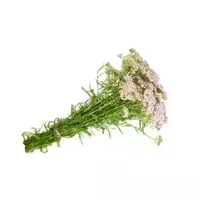Yarrow

Yarrow or other trees are referred not only to the most popular means of alternative medicine, but also fragrant plants that are used in cooking. As you know, yarrow infusions were previously used to treat dysentery and other gastrointestinal diseases. In addition, its ability to stop internal bleeding is considered a distinctive property of the yarrow.
Being a perennial, this herbaceous plant is characterized by a long creeping rhizome with straight stems departing from it with rosettes of basal leaves. At the top of the yarrow stem there is an inflorescence represented by a shield with small flower baskets.
It is customary to use young shoots, leaves and yarrow flowers as food, which can serve as a wonderful seasoning for vinaigrettes and salads. In addition, they are often added to meat and fish dishes, as well as decoctions for compotes or in dough. Dried herb and yarrow flowers are used for flavouring beverages, mousses or jelly. Powdered dried leaves and yarrow flowers, which are pre-ground in a mortar and sieved through a sieve, are used to season and flavour hot soups.
In European cooking and cuisine in the United States, vegetable and potato soups, asparagus bean side dish, game in their own juice, goulash, cheeses are often flavored by the plant. However, when adding this aromatic herb, you should strictly adhere to the recipe - the norm for laying a yarrow is an amount not exceeding half a teaspoon per meal, designed for four servings. This is due to the content of bitterness in the plant.
Yarrow composition
Tannins, essential oils (camphor, hamazulen, tui-on), flavonoids (choline, achillein), phytoncides, saponins, alkaloids, resins, polysaccharides, organic acids, carotene, gums, as well as vitamins C and K.
In addition, yarrow includes elements such as potassium, calcium, magnesium, selenium, boron, molybdenum, zinc and copper. To say, yarrow leaves contain more bitter substances, while flowers are rich in essential oils.
Benefits of yarrow
The benefits of yarrow for human health lie in the presence of numerous healing properties in this plant, due to which it is used in folk medicine. This herb is known to have bactericidal, anti-inflammatory and astringent effects. In addition, yarrow is able to tone the skin, soothing irritations.
Yarrow is used as an effective hemostatic agent for local bleeding - dental, nasal, from small wounds, scratches, abrasions, fibromyomas, hemorrhoidal bleeding and inflammatory processes. In addition, the benefits of yarrow have been proven in gastrointestinal diseases - gastritis, colitis, peptic ulcer.
yarrow 0 kCal
The energy value of yarrow (Ratio of proteins, fats, carbohydrates - ju):
Proteins: 0 g (~ 0 kCal)
Fats: 0 g (~ 0 kCal)
Carbohydrates: 0 g (~ 0 kCal)
 Español
Español Français
Français Português
Português Русский
Русский 简体中文
简体中文 繁體中文
繁體中文 日本語
日本語 한국어
한국어 العربية
العربية Türkçe
Türkçe Қазақ
Қазақ Deutsch
Deutsch Italiano
Italiano Українська
Українська
